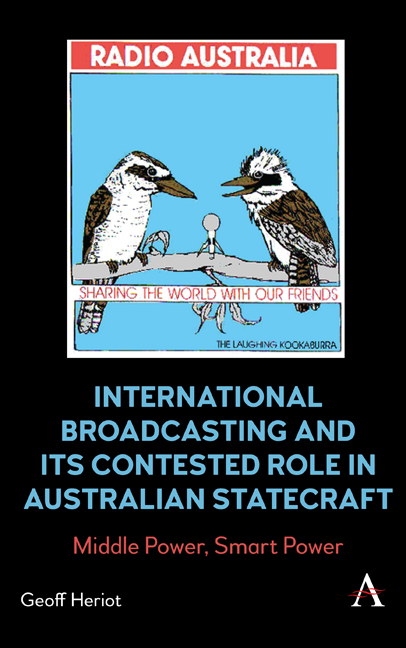 International Broadcasting and Its Contested Role in Australian Statecraft
International Broadcasting and Its Contested Role in Australian Statecraft Book contents
- Frontmatter
- Dedication
- Contents
- List of Figures
- Foreword
- Acknowledgements
- Chapter One Introduction
- Chapter Two Media and the Contest of Ideas
- Chapter Three International Broadcasting and Its Discursive Properties
- Chapter Four Mobilising ‘Softer’ Power in a Hard World
- Chapter Five Australia’s ABC: State Interests, National Evolution
- Chapter Six Purpose, Performance and Evaluation
- Chapter Seven Modernising the ABC
- Chapter Eight Policy, Priorities and Qualified Independence
- Chapter Nine Engaging with Intercultural Audiences
- Chapter Ten Indonesia, the Crucible
- Chapter Eleven Strategic Contingency and War
- Chapter Twelve Looking to the New Disorder
- Index
Chapter Five - Australia’s ABC: State Interests, National Evolution
Published online by Cambridge University Press: 15 November 2023
- Frontmatter
- Dedication
- Contents
- List of Figures
- Foreword
- Acknowledgements
- Chapter One Introduction
- Chapter Two Media and the Contest of Ideas
- Chapter Three International Broadcasting and Its Discursive Properties
- Chapter Four Mobilising ‘Softer’ Power in a Hard World
- Chapter Five Australia’s ABC: State Interests, National Evolution
- Chapter Six Purpose, Performance and Evaluation
- Chapter Seven Modernising the ABC
- Chapter Eight Policy, Priorities and Qualified Independence
- Chapter Nine Engaging with Intercultural Audiences
- Chapter Ten Indonesia, the Crucible
- Chapter Eleven Strategic Contingency and War
- Chapter Twelve Looking to the New Disorder
- Index
Summary
Nine years after the advent of commercial radio broadcasting in Australia, and seven years prior to the onset of World War II, Prime Minister Joseph Lyons launched the newly constituted Australian Broadcasting Commission (ABC) from a radio studio in Sydney. From 8 pm on that day, 1 July 1932, listeners in the prime minister’s home state on the island of Tasmania could hear him only through atmospheric static because no telephone link existed with the mainland (Inglis 2006, p. 5). The broadcast had to be picked up long-distance from Sydney and relayed via the local transmitters of station 7ZL in Hobart.
On 20 December 1939, Prime Minister Robert Menzies launched international radio broadcasts in the English, German, Dutch and Spanish languages; noting that, although Australia lay 12,000 miles from Europe, ‘we are nevertheless involved in a European war and in full partnership with Great Britain in its conduct’ (Hodge 1995, p. 8). By 1942, ‘Australia Calling’ also broadcast in Japanese. It operated under the wartime government Department of Information except for the two years between July 1942 and April 1944 when the public service broadcaster (ABC) administered it. But the government information department controlled its news and commentaries even during that two-year period (Hodge 1995, p. 11).
Provenance is germane when considering the character and conduct of the Australian form of international broadcasting. Even if an embellishment, it is worth recalling Peter Drucker’s often-cited comment that organisational ‘culture eats strategy for breakfast’ (Edgar, Campbell & Stonehouse 2011). Institutional history, the evolution of organising principles and the consolidation of production norms prove to be compelling forces of indoctrination. This chapter provides a brief account of the ABC’s development as a national–domestic and an international broadcaster in the decades prior to 1983 when Parliament enacted legislation to re-constitute and modernise the organisation. That legislative change, detailed in Chapter 7, represents a useful baseline for the pre- and post-1983 era and its reconstitution as a corporation. Prior to 1983, the ABC’s national–domestic and its international services operated in closer proximity to government and under more direct administrative authority than in the decades since.
- Type
- Chapter
- Information
- International Broadcasting and Its Contested Role in Australian StatecraftMiddle Power, Smart Power, pp. 89 - 104Publisher: Anthem PressPrint publication year: 2023


